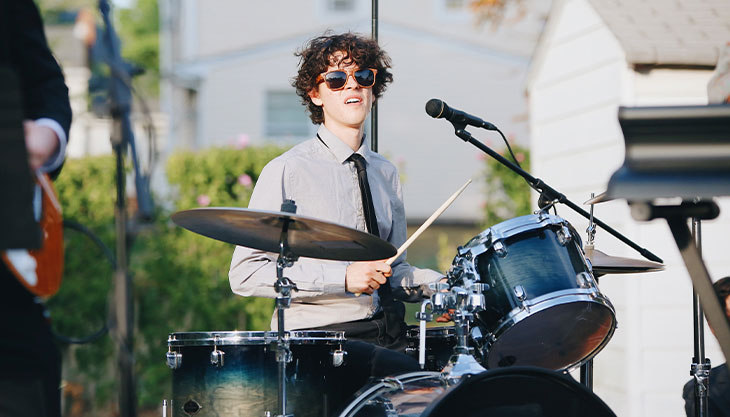How Drumming Helps Children with Special Needs

Music is a very important tool and plays a great role in the lives of children. Children born with a syndrome, profound cognitive impairment, terminal illness, psychiatric problems, developmental delays, panic attacks, or learning disabilities are often referred to as children with special needs.
Such children are easy to spot because they have challenges that are more severe than those faced by typical children. In most cases, these challenges may last for a lifetime thereby necessitating the need to provide such children with additional support, guidance, and services.
One of the best ways to help these children is through music therapy. Drumming, in particular, has been instrumental in positively impacting the lives of children by developing their skills and improving their general well being.
- How Drumming Helps Children with Special Needs
Drumming, according to Dr. Steve Draper, has a unique blend of physical activity, coordination and musicality, that are beneficial to a child’s well being. Scientific study shows that drumming offers a lot of benefits.
Children learn how to interact with their peers, follow instructions, and even learn faster at school. The question is how exactly does drumming help children with special needs? Below are some of the ways drumming can help:
- It supports fine and gross motor skills. Children with special needs can have improved arm movement, better eye-hand coordination, and stronger upper body control. When such children drum with mallets, they grasp, reach, and move more fluidly. The different techniques used in drumming can be helpful in working on the child’s fine and gross motor skills. Developing the lower extremity strength of a child is also made easier.
- It helps with impulse control. Drumming is great for supporting emotional needs of children with special needs. Such children can help children vent aggression, stay calmer and generally regulate their emotions.
- It increases communication and speech. Drumming also helps to improve children’s speech, sounds, and vocalisations. Building of sentences, reinforcing of word syllables and expansion of full sentences are made possible through playing drums. This is made easier when the child with special needs is made to sound out each syllable or word while simultaneously playing it on the drum.
Children tend to develop the ability to communicate better with their peers and adults while drumming. This communication can be nonverbal, which is sometimes more effective and powerful than spoken language. According to Hans Christian Anderson, “where words fail, music speaks”.
- It develops social skills. Drumming can be done in groups to develop social skills. The collaborative and interactive processes involved while drumming can encourage children with special needs feel like part of the success of a group, if correctly facilitated. Group drumming has a lot of benefits for children with special needs. Such children learn to share, listen, pay rapt attention, take cues from each other, and even take turns.
- It boosts self-esteem. Drumming can be lots of fun for children as a way of boosting their self-esteem while learning a nice skill. More so, by drumming, children with special needs tend to feel safer, which in turn encourages them to express their feelings better. The fact that it is also easier to bond with such children while they are drumming and you are singing along or playing another instrument is also great.
- It is multi-sensory.
 The fact that drumming is multi-sensory helps children learn faster, improve brain function, facilitate engagement, and build skills. While hitting a drum with a mallet, your children’s tactile system is engaged as they feel the mallet in their hand.
The fact that drumming is multi-sensory helps children learn faster, improve brain function, facilitate engagement, and build skills. While hitting a drum with a mallet, your children’s tactile system is engaged as they feel the mallet in their hand.
As they move their wrists and arms to strike the drum, they are engaging their kinesthetic system. Their auditory system comes to play while they listen to the sounds from the drum. Then as their eyes are focused on their arm motions and the mallet in their hands, their visual system is engaged. The only senses these children do not really make use of while drumming are those of taste and smell.
- It reduces depression. Children with special needs easily get depressed because they become aware that they are quite different from their peers. Drumming is fun to such children and helps to reduce depression. When they drum, they feel happier and have a sense of belonging, especially when they play in a group.
- It motivates them. It is sometimes hard to motivate children to carry out tasks that are challenging. However, drumming is one of the best motivators for children with special needs. By drumming, children with special needs are encouraged to be part of a music band, bond with family members and outsiders, and play. When they drum, they are also encouraged to involve their motor skills.
- It processes in both regions of the brain. Drumming is a form of music that is simultaneously processed in many regions of the brain. These regions include the amygdala, auditory cortex, sensory cortex, motor cortex, prefrontal cortex, cerebellum, hippocampus, and visual cortex. These areas combine to increase the child’s interest and fun while drumming.
- It meets the cognitive needs of the child. Basic cognitive skills like impulse control, decision-making, and attention are improved while drumming. Children learn rhythm, timing, and dexterity. Their ability to concentrate on a task is also made easier.
Conclusion
Drumming has a lot of social and emotional benefits to children with special needs. Your child will enjoy support in the following areas: group cohesion, depression, self-expression, bi manual coordination, grief, self-esteem, behavioural issues, and learning.
Simon Dupree
Simon Dupree has discovered he has a passion for music from a very young age. Ever since then, music has been an essential part of his life. When he is not practicing, he`s probably behind the keyboard writing for Music Groupies.

 The fact that drumming is multi-sensory helps children learn faster, improve brain function, facilitate engagement, and build skills. While hitting a drum with a mallet, your children’s tactile system is engaged as they feel the mallet in their hand.
The fact that drumming is multi-sensory helps children learn faster, improve brain function, facilitate engagement, and build skills. While hitting a drum with a mallet, your children’s tactile system is engaged as they feel the mallet in their hand.

